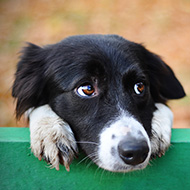Concerns over rising cost of living on dog welfare

Dogs Trust fears the rising cost of living could lead to an increase in stray and abandoned dogs, as seen following the 2008 recession.
One-third of UK dog owners believe the cost-of-living crisis is making it harder to care for their animals, according to new research.
The survey conducted by Dogs Trust found that two-thirds of UK dog owners feel worried, to some extent, about how they will care for their dog, with 30 per cent either 'very' or 'fairly' worried.
The biggest concern cited by respondents was how to manage veterinary costs (48%), followed by the rising cost of dog food (17%) and insurance (15%). Interestingly, more than half of non-dog owners said the increasing cost of living would prevent them from adopting or buying a dog.
Dogs Trust said the findings paint a 'gloomy picture' that reflects its own interactions with current and prospective dog owners. The charity has already noted a steady rise in the number of people making the heartbreaking decision to give up their dog.
Owen Sharp, Dogs Trust CEO, also expressed concern that the rising cost of living could lead to an increase in the number of stray and abandoned dogs, as seen in the year following the 2008 recession.
“We know from the experience of the 2008 recession that economic crisis can and will lead to people needing to give up their beloved dogs," he said. "Sadly, many loving dog owners simply won’t be able to afford to keep them.
"At Dogs Trust we’re rehoming and fostering dogs as quickly as we can - but as soon as we free up a kennel space, there’s a dog to fill it again.”
Mr Sharp added that Dogs Trust had already taken 13,000 calls this year from owners needing to give up their dogs - a 58 per cent rise from the previous year.
“We know that dog owners need immediate help, and we’re working hard to find ways to support them - but it takes time," he continued.
“If you’re really struggling, please contact Dogs Trust - even if we can’t take in your dog immediately, there may be other types of help we can suggest, like our Hope Project, which aims to keep anyone experiencing a housing crisis and their dog together, and helping people find other services such as pet food banks or local charities that could ease the burden.”
“We want dog owners to realise that they don’t have to wait until they are in crisis to call us for help.”



 The latest
The latest